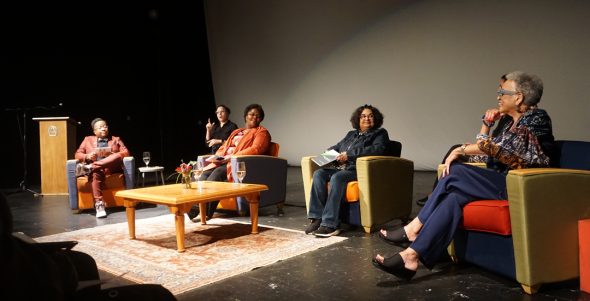On Wednesday, Sept. 13, Antioch College hosted a Fireside Chat on intergenerational feminism.
The panel, moderated by Xavier Portis, included Johnnetta Betsch Cole, Ph.D., an American anthropologist, educator, the first woman to serve as president of historically Black institution Spelman College, and former president of Bennett College; Queen Meccasia Zabriskie, Ph.D., the new resident fellow and visiting associate professor of social sciences at Antioch College; and Suparna Bhaskaran, Ph.D., who once taught at Antioch College and is now a nonresident fellow at the Institute on Race, Power and Political Economy at The New School, a private research university in New York City.
Over the course of the evening, the three educators illuminated the multifaceted nature of feminism, emphasizing its intergenerational significance and the need for a more inclusive and evolving feminism that embraces all identities and perspectives. The educators also spoke on the ways that anti-racism efforts have historically intersected with feminism.
Cole, with a lifetime of reflection behind her, described feminism as both a theory and an action and stressed the importance of remembering how feminism is connected to societal marginalization on a larger scale.
“Feminism … centers any and all people who identify as women in this struggle against all forms of oppression, but I think we’ve got to add to this powerful necessary idea of feminism, which also calls for the liberation of people in all marginalized communities,” Cole said. “I think it’s really important to understand that we’re not in this struggle for ourselves. We’re in the struggle for all of us.”
Bhaskaran introduced an intriguing perspective by highlighting attention as a political act, and emphasized some aspects of feminism that she considers to be fundamental: What people pay attention to, who they pay attention to, and why they pay attention. Fairness, fighting injustice and dismantling multiple forms of domination, she said, are at the core of feminism.
“Attention is political — it is, therefore, ethical, and moral, all at the same time, and I also think that many of us might already be feminists without actually having the word feminism,” Bhaskaran said.
Zabriskie defined feminism as a movement against a system that perpetuates the idea of men’s superiority and the subsequent power imbalance. In speaking with her fellow panelists, she shared her personal journey into feminism, crediting her mother for instilling values of equality and justice from a young age.
“Before I understood and knew who [feminist writer] bell hooks was … and before I even knew the word feminism … I had the actions of my mother and how she raised us that said … ‘All of you are of value and you need to learn how to do and help out and work together so that this house can function,’” she said.
Continue reading over at Yellow Springs News.
Words by Truth Garrett.


